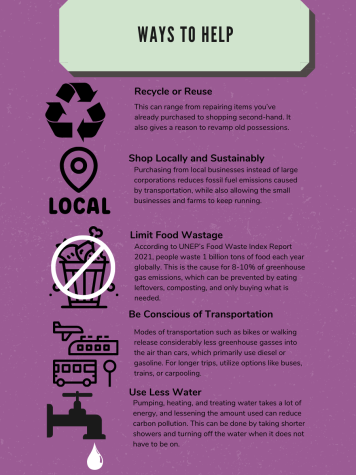A rundown on one of the Earth’s most fixable problems: climate change
May 19, 2022
Scientist Rebellion leaks IPCC Report to “show that scientists are willing to disobey and take personal risk to inform the public.”
“There’s no time to wait around, there’s no time for continued inaction – the people deserve to know now what our corporate owned politicians have done to them,” Scientist Rebellion says. “The greatest crime ever has already been carried out – the perpetrators are still at liberty, but the victims are starting to pile up.”
The Scientist Rebellion is an organization consisting of scientists using non-violent methods as a last effort to shine a light on the severity of climate change and to get people in positions of power to pay attention to it. They have done this through protests and by leaking the Working Group III report made by the Intergovernmental Panel on Climate Change (IPCC). For years scientists and people impacted by climate change, such as Indigenous communities, have been trying to steer the public away from the climate emergency the earth is now in.
“As scientists, we have tried writing reports and giving presentations about the climate and ecological crisis to those in power,” Scientist Rebellion says. “We must now have the humility to accept these attempts have not worked. Now is the time for us to take action so that we show how seriously we take our warnings.”
The leaked IPCC report, ‘The Mitigation of Climate Change’, detailed the main sources of greenhouse gas emissions and if strategies implemented to reduce them will work. The IPCC was created to give Governments scientific information that could be used to create climate policies.
The Scientist Rebellion leaked this report to give the public access to it before there was a chance for governments to edit the conclusions drawn from it. Informing people of the gravity of climate change and what it will do to earth and its civilizations sooner rather than later allows more time to make a change.
“[The report] states that individual behavioral changes alone are insignificant,” Scientist Rebellion says. “It states that justice, equity, and redistribution are essential to climate policy.”
What is Climate Change?

Burning fossil fuels is one of the largest contributing factors to greenhouse gasses going into the atmosphere. Individual changes will not be as impactful as they could have been years ago. The main uses for fossil fuels, including heating for homes and transportation, only account for 29% of emissions. The remaining 71% of greenhouse gas emissions are linked to oil, coal, and gas companies.
Peter Kalmus, a climate scientist at National Aeronautics and Space Administration (N.A.S.A.), along with three other protestors, chained themselves to a JPMorgan Chase Bank in Los Angeles on April 6. JPMorgan Chase has financed 317 billion dollars in fossil fuels since 2016 when the Paris Agreement was enacted.
The Paris Agreement is a treaty created to commit countries to reduce their greenhouse gas emissions and adapt to the impacts of climate change. The agreement was created in December of 2015 and 192 countries and the European Union have joined it. Even though these countries’ governments have agreed to reduce their emissions, carbon dioxide levels are higher than they have ever been in 800,000 years.
The average amount of carbon dioxide in the atmosphere globally hit a record high in 2020 at 412.5 parts per million. The ideal amount would be somewhere between 280 and 350 parts per million. Having such a substantial amount of carbon dioxide emitted into the atmosphere prevents natural processes, such as forests capturing pollutants, from removing them, thus the net global amount of carbon dioxide increases.
Fossil fuels are created through burning materials such as gas, oil, and coal. When they burn, they release greenhouse gasses, carbon dioxide, and methane, into the atmosphere. When there is too much greenhouse gas, the earth cannot fight it all off, and the excess traps heat, which raises the temperature. This results in global warming, one of the most notable effects of climate change.
Why should we care?
When the average temperature of the planet rises, life begins changing. Severe weather becomes more common, the air gets dirtier, and oceans become more acidic.
Heavier and more frequent rainstorms lead to homes flooding and agricultural areas being destroyed. Additionally, unclean air can affect the cardiovascular system and irritate respiratory conditions like asthma. On top of that, excessively acidic oceans make living conditions for marine organisms more difficult by causing their shells and skeletons, which can be made of calcium carbonate, to dissolve.
Because of the developed state of climate change, continued reductions in greenhouse gas and carbon dioxide emissions would improve air quality and slow down climate change, but it could take 20 to 30 years for global temperatures to stabilize.
“Regardless of how much you [try] to ignore it, it is already happening now,” junior Achint Saberwal said. “What you see now is not anything compared to how it will affect you in 10 years.”
Warning of Warming
When the effects of climate change emerge, they often appear in marginalized communities. Due to economic inequity, some of these communities are unable to adapt to the continually growing impacts of climate change, which causes them to experience the changes more. According to Earth.org, the disparities caused by climate change can be divided into four categories: economic, racial, regional, and generational. All of which cause certain populations to struggle environmentally and economically more than others.
Indigenous communities feel the consequences of climate change commonly before the rest of the world. This is due to the close relationship many Indigenous Peoples have with the Earth.
Climate change happens naturally over time, however, it has been drastically increased because of human activities. It has been rapidly escalating for years, during which some Indigenous Peoples have tried to warn about what consequences will follow if humans continue on their path with no effort to stop it.
Saberwal hopes to be an Environmental Lawyer to help largely impacted communities.
“There is a lot of inequality with who is being affected,” Saberwal said. “It is mostly people of color and people of lower socioeconomic status.”
In a study published by ScienceDirect, it was found that the levels of biodiversity, the variation of life in the world or in an ecosystem, were the highest in lands that Indigenous communities manage. Biodiversity is one of the areas most impacted by climate change, but it is also one of the main sources that can help reduce it. Natural ecosystems help regulate greenhouse gas emissions, but extreme weather conditions destroy the ecosystems that can help stop them from happening.
Working alongside and listening to Indigenous communities can help the government develop better strategies and agreements to stop climate change.
How can you help?
Stagnancy is one of the driving factors of climate change. Not adapting to preserve and save what resources are left on the Earth, will lead to inhabitable land. One where its demise could have been prevented.
“What are the children 100 years into the future going to face just because of the inactivity we have today,” Assistant Atmospheric Scientist Paytsar Muradyan said.
Reducing your carbon footprint can be done by making small changes throughout the day.

One gallon of gasoline can emit up to 22 pounds of carbon dioxide into the atmosphere. Choose to walk instead of drive when able, and use public transportation or carpooling for longer travels.
Shop sustainably for clothing instead of purchasing from fast fashion companies. This can be done by thrifting and buying from eco-friendly brands when possible. Clothing production leads to clothes being put in landfills, large amounts of water being used, and pollution being released. This also ties into reusing and recycling, which limits the amount of wastage sent to landfills.
“I try to carpool as much as I can if I have to take a car,” Saberwal said. “Then I have those cute Trader Joe’s tote bags and I will take [them] to grocery stores.”
Taking small steps during the day can help limit climate change, and could even help stop it, but only if large corporations limit their greenhouse gas emissions. The emissions let out by these companies hold the power to make the state of the atmosphere worse, which also means that they can stop it by turning onto a different path.
“But [those small changes] are not going to be enough,” Muradyan said. “Big corporations. Factories need to step in, they need to cut down their profits and cut down emissions.”
Even this can be helped. Muradyan believes that voting representatives into office that will work towards a solution for this problem can be beneficial. If that is not probable, educating others on what is happening is a step in the right direction.
“I started changing my perspective into more of ‘what can I do in my life and how can I educate the people around me,’” Saberwal said.
In 20 years, Muradyan hopes to see people doing what they can to slow down climate change and develop resilient communities.
“Climate change is undeniably happening and we are contributing to it greatly,” Muradyan said. “My biggest concern is that we will not come together as humans to solve the problems we are facing.”
Asha • May 26, 2022 at 8:11 am
I would love to not have to imagine a world where corporations and businesses care more about the earth than their profits. This article was great at informing what climate change is and what needs to be done about it. I hope our generation can be the ones to help.
Helena • May 20, 2022 at 12:18 pm
The way this article lists everyday ways to do our part to help improve our climate is amazing!
Liam Pummer • May 19, 2022 at 1:21 pm
I feel that people should stop using fossil fuels for energy. It seems to me, given that so many people care about things that use fossil fuels for energy, the money they blow through buying gas and oil would be more useful and ecologically friendly for funding industries that utilize electric or solar power.
Converting solar energy into power is logically infinite during the time the sun is up, and the saved power could be used during the night. This is an idea I had when I viewed reports on how fossil fuels were impacting the environment.